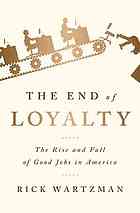
The End of Loyalty
The Rise and Fall of Good Jobs in America
کتاب های مرتبط
- اطلاعات
- نقد و بررسی
- دیدگاه کاربران
نقد و بررسی

March 20, 2017
Wartzman, a senior advisor at the Drucker Institute, documents the deterioration of company-employee loyalty at some of America’s corporate giants in this insightful economic history. Identifying the “great American dream” as having a “good job”—a dream that’s increasingly precarious—he notes driving for Uber as a perfect example of many jobs in the U.S. today that involve no real, long-term commitment between employer and employee. He cites dismal statistics about many Americans being unprepared for retirement due to low pay, poor pension benefits, and increased medical costs, all while corporate earnings climb to historic highs. In order to understand how this came to pass, he examines four companies—General Electric, General Motors, Kodak, and Coca-Cola—over the past 70 years. He identifies a combination of factors as responsible for weakening the corporate social compact: globalization, company-wide spates of downsizing, ineffective unions, and more. Perhaps most significant is the elevation of shareholders over employees.This impeccably written treatise asserts that it’s imperative for Americans to “share our prosperity more broadly once again” and reinstitute a stronger social contract between corporate executives and the workers who make a company successful. Agent: Kris Dahl, ICM.

March 15, 2017
A sharp-edged examination of why large American employers shifted from loyalty to their workers to loyalty focused primarily on stockholders.Through deep reporting and anecdotal storytelling, former Wall Street Journal and Los Angeles Times writer and editor Wartzman (What Would Drucker Do Now?: Solutions to Today's Toughest Challenges from the Father of Modern Management, 2011, etc.), a senior adviser at the Drucker Institute, delineates the often shameful evolution of policies by concentrating on four of the biggest corporations in the world: Coca-Cola, Kodak, General Motors, and General Electric. The contrast between relatively beneficial employee-employer relations during the 1950s and today's lopsided relationship hangs over the lengthy narrative. The author pinpoints the rise and gradual decline of large labor unions within American industry as one of the major causes of employers cutting benefits for some workers and firing others. Wartzman wisely emphasizes how judges favoring corporate rights also played a significant role; he cites a 1998 federal appeals court ruling that, as an employee-oriented lawyer said, -decided that American industry no longer needed to keep its promises.- Many of those broken promises involved reducing or eliminating pension funds and subsidized health insurance, leaving both current and retired employees desperate to find alternatives, often without success. In the meantime, high-level corporate executives increased their own pay and benefits, usually without objections from shareholders. At the close of the book, Wartzman devotes space to his well-informed opinion that the social contract between employers and employees may never be reconstructed, due to consistent emphasis on maximizing profits, the globalization of production, advances in technology, and the demise of counterbalancing labor unions. Wartzman suggests government intervention would be needed to repair the imbalances, including policies that could revive labor union organizing, make remaining benefits portable from job to job, crack down on wage theft by employers, and more.A lively history with relevance to every worker.
COPYRIGHT(2017) Kirkus Reviews, ALL RIGHTS RESERVED.

April 1, 2017
The changing relationship between large American corporations and their workers in the 20th century provides the basis for this thoughtful and enlightening volume by Wartzman (senior advisor, Drucker Inst.). Focusing on four large corporations, including General Motors, General Electric, Kodak, and Coca-Cola, the author examines how both workers and employers mutually developed what he calls a "social contract" that by midcentury had provided a reliable, stable workforce for companies who by then were prospering as never before in the post-World War II economy. In return, workers gained security, solid wages, and excellent benefits. As Wartzman shows, this balance was reached with some difficulty in the years of large-scale unionization marked by often-bitter strikes during the Great Depression. This mutually beneficial relationship between workers and managers became strained within a decade. The remainder of the 20th century saw significant changes that weakened the positions of companies and their employees and virtually eliminated the mutually beneficial contract. Corporations faced technological change, new forms of competition, and restructuring. Workers experienced the effects of these forces in a way that distanced them from their employers and often eliminated their bargaining strength. VERDICT Highly recommended for general readers and those interested in labor-management issues.--Charles K. Piehl, Minnesota State Univ., Mankato
Copyright 2017 Library Journal, LLC Used with permission.

May 1, 2017
Wartzman, senior advisor at the Drucker Institute, explores what could be the defining questions of the twenty-first centurywhere we were, where we are, and where we are headed in terms of jobs and the nature of corporate America in all its bitter reality. His research is excellent and even-handed, yet his writing is sometimes difficult to follow, what with the many personalities included and all of the economic changes over time. Fortunately, the story is long on significance and short on partisanship. It really needed to be told in a book-length form sophisticated enough for the downsized executive and understandable enough for the laid-off factory hand. Wartzman draws on his extensive experience to catalogue the struggle for a social contract between management and labor and that contract's dissolution. He calls on diverse sources, from Saul Alinsky to Milton Friedman to many representatives of unions, government agencies, and business. Essential reading for those who have ever worried about their jobs.(Reprinted with permission of Booklist, copyright 2017, American Library Association.)

























دیدگاه کاربران